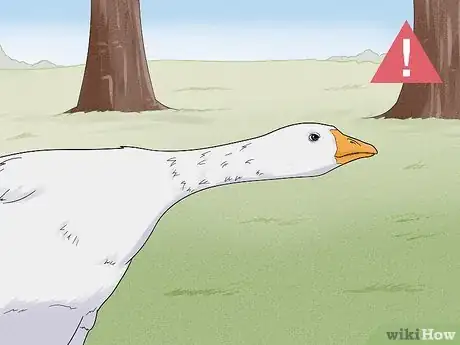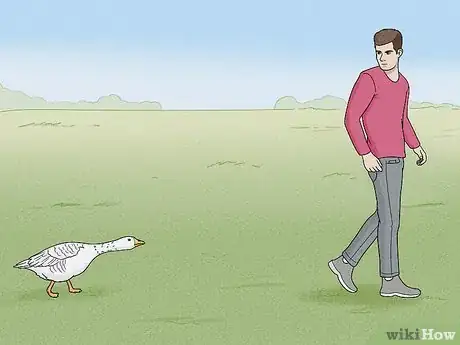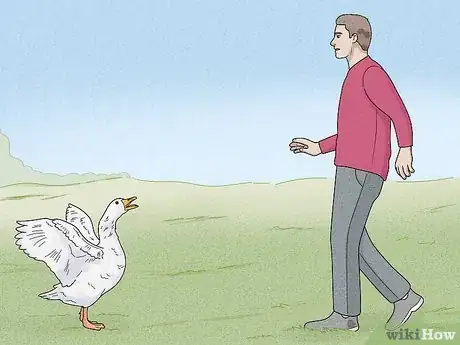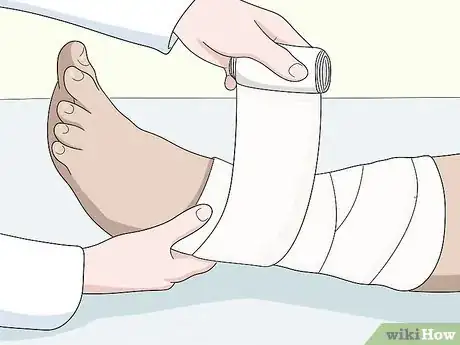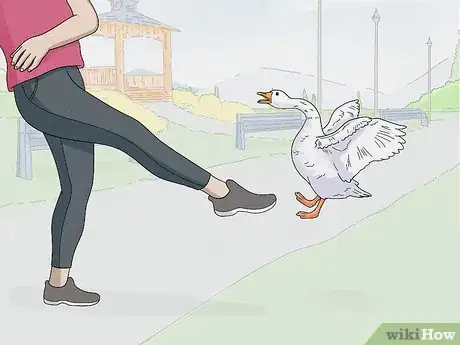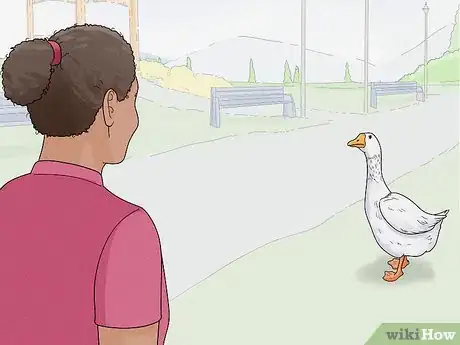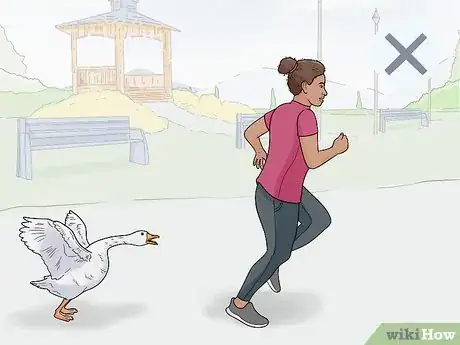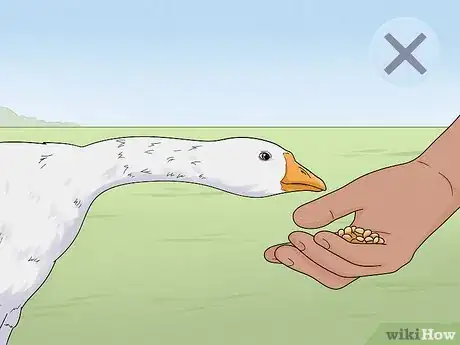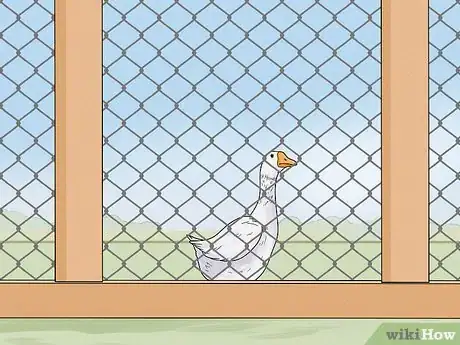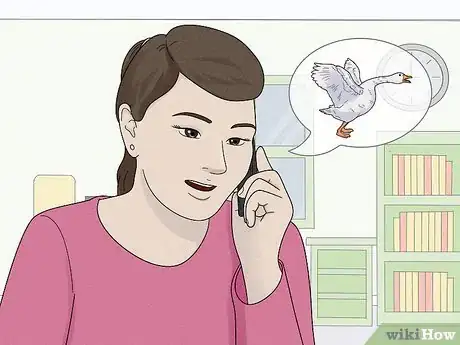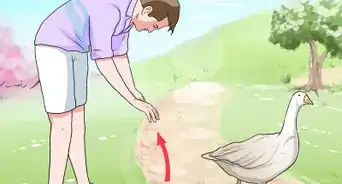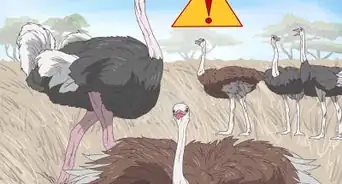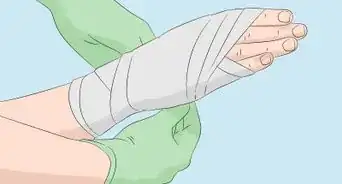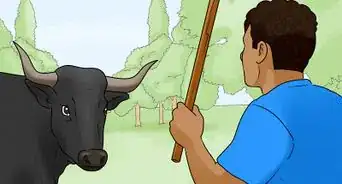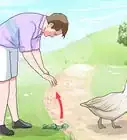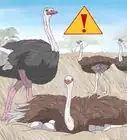This article was co-authored by wikiHow Staff. Our trained team of editors and researchers validate articles for accuracy and comprehensiveness. wikiHow's Content Management Team carefully monitors the work from our editorial staff to ensure that each article is backed by trusted research and meets our high quality standards.
wikiHow marks an article as reader-approved once it receives enough positive feedback. This article received 20 testimonials and 86% of readers who voted found it helpful, earning it our reader-approved status.
This article has been viewed 376,434 times.
Learn more...
Geese are territorial birds and are known to chase or attack anyone who disturbs their territory. While geese may chase people, an actual physical attack is fairly rare. You can stop a goose's aggression by respectfully leaving its territory. Back away slowly, while remaining calm. Do not do anything that may escalate the situation, like yelling. In the event you are injured, seek medical attention to assess your injuries.
Things You Should Know
- Watch out for signs of aggression from geese like hissing, honking, sticking their necks out straight, or pumping their heads up and down.
- Resist the urge to feed geese. They may lose their fear of humans and become aggressive to get more to eat.
- Prevent attacks by building fences or other barriers around your yard or contacting animal control if geese are a consistent problem.
Steps
Getting Away from the Goose
-
1Watch for warning signs of an imminent attack. You may be able to get away before a goose becomes too aggressive if you see the warning signs of an attack. Pay attention to any potential signs of aggression when you're near a goose.
- At first, a goose will bend its head back slightly. This indicates aggression. If the goose then bends its neck out straight, this shows the aggression is increasing.
- If a goose is about to attack, it will pump its head up and down.
- Geese may hiss or honk as well if they are becoming aggressive.
-
2Leave before a goose begins to chase you. If you notice warning signs of an attack, leave before the goose begins to chase you. If the goose sees you're backing away, it may decide you're not a threat. Back away slowly until you're a good distance from the goose and it's stopped making aggressive gestures.Advertisement
-
3Back away slowly if the goose becomes aggressive. In the event the goose starts chasing you, back away slowly. Stay faced towards the goose and use your peripheral vision to guide your movements. Make sure to avoid anything you may trip over, as this may give the goose reason to attack.[1]
-
4Remain calm. If you appear frightened or upset, a goose could take this as a sign of aggression. It's a good idea to maintain a calm, neutral demeanor when backing away from a goose. If you're struggling to remain calm, take a few deep breaths as you back away. Keep in mind that, while geese can be territorial, an actual physical attack is very rare.[2]
-
5Seek medical attention if you're injured. In the event a goose bites you or hits you with its wings, seek medical attention. Geese are strong, and can cause injury when provoked. You may require stitches or a cast if a goose attacks you. Go to the emergency room for assessment as soon as you get away.
Avoiding Escalating the Situation
-
1Do not become hostile. If you're being chased by a goose, your inclination may be to scare it off. However, getting hostile will only be seen as aggression. That will cause the goose to attack. [3]
- Do not yell at the goose. It's better not to say anything, as to avoid provoking it.
- You should also not make any physical gestures towards the goose. Do not kick, swing your arms, or throw anything at the goose.
-
2Avoid turning away. It's very important you face the goose until it stops pursuing you. Keep an eye on the goose at all times. Do not close your eyes or turn your back from the animal. Watch the goose carefully until it backs off.[4]
-
3Do not run. As you should keep your eye on a goose, running is not recommended. If a goose sees you running, this may encourage it to chase you more. Also, running may make you appear excited or agitated, which a goose may perceive as aggression. Even if a goose is gaining ground, remain calm and take slow, careful steps to get away.[5]
Preventing An Attack
-
1Do not feed geese. Feeding geese can easily trigger an attack. Geese may lose their fear of humans if fed too frequently. They may also become aggressive over food, going after people for not handing over food.
- If there are geese at a local park or nature center, encourage others to avoid feeding them. You could talk to a ranger at the park about strongly enforcing rules that prevent people from feeding geese.
- If you're at a park, do not feed the geese. If you have young children, strongly discourage them from feeding the birds.
-
2Put up barriers, if possible. If there are bothersome geese in your yard, consider putting up barriers. Small fences can protect you and your family from potentially aggressive geese. If there are geese at a public place, like a park, contact officials and request barriers.
-
3Inform the proper authorities if geese are becoming a problem. It's difficult to entirely prevent geese if you live in an area where they are prevalent. However, measures can be taken to minimize attacks. You can contact your local Department of Natural Resources to report the problem. The DNR can look into ethical solutions, such as putting up extra fences or using scare tactics like orange flyers to discourage the geese from bothering people.
Community Q&A
-
QuestionWhat should I do if a goose lands on my head and smacks me in the face repeatedly?
 Community AnswerJust like being in a fire, you should stop, drop, and roll. This makes it very difficult for the goose to maintain a hold on your head. If you roll fast enough, it also makes the goose dizzy.
Community AnswerJust like being in a fire, you should stop, drop, and roll. This makes it very difficult for the goose to maintain a hold on your head. If you roll fast enough, it also makes the goose dizzy. -
QuestionThere is a goose at work who doesn't attack anyone but me. What can I do?
 Community AnswerTravel in a group so the goose will not single you out.
Community AnswerTravel in a group so the goose will not single you out. -
QuestionWhy do geese attack humans?
 Community AnswerThey are territorial and protecting their nesting areas.
Community AnswerThey are territorial and protecting their nesting areas.
Warnings
- Goose bites can really hurt. They can also use their feet and wings to inflict damage to your skin or face. Do not laugh off a goose attack, as it can potentially cause injury.⧼thumbs_response⧽
References
- ↑ http://www.huffingtonpost.com/2013/05/18/hewlett-packard-geese-attacks_n_3289096.html
- ↑ http://www.huffingtonpost.com/2013/05/18/hewlett-packard-geese-attacks_n_3289096.html
- ↑ http://www.huffingtonpost.com/2013/05/18/hewlett-packard-geese-attacks_n_3289096.html
- ↑ http://www.huffingtonpost.com/2013/05/18/hewlett-packard-geese-attacks_n_3289096.html
- ↑ http://www.huffingtonpost.com/2013/05/18/hewlett-packard-geese-attacks_n_3289096.html
About This Article
To stop a goose attack, back away slowly from the goose if you see it moving its head up and down, or hear it honking or hissing, which are all signs of aggression. As you back away, try to face the goose and remain calm, since geese interpret fear as a sign of aggression. Additionally, avoid running away as this is likely to encourage the goose to chase you. Instead, when you reach a safe distance, walk away from the area calmly. If the goose bites you or strikes you with its wing, seek medical attention as soon as possible. For tips on how to inform the authorities about aggressive geese, keep reading!
